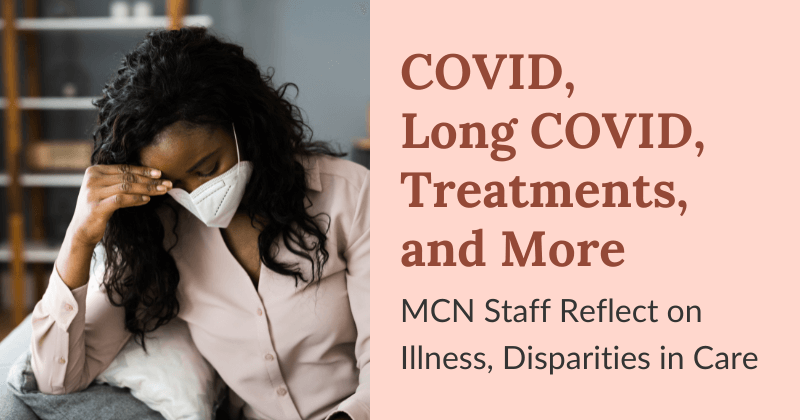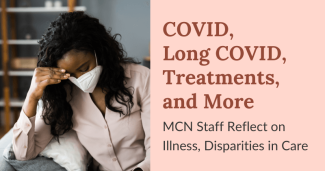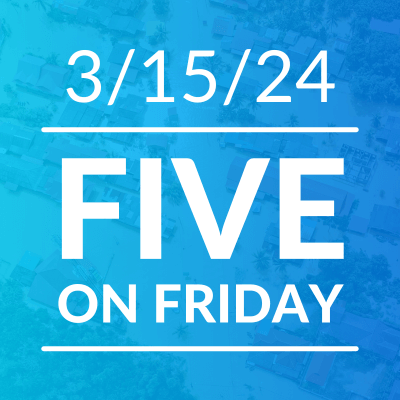COVID, Long COVID, Treatments, and More: MCN Staff Reflect on Illness, Disparities in Care

Over the pandemic, despite numerous precautions, many MCN staff members have wrestled with COVID, myself included. Over the summer, as BA.5 became the predominant variant, several of us came down with the virus, and our experiences with the illness varied widely.
Among the staff at MCN, some quickly began treatments like Paxlovid, while others were unable to secure them. We all had differing experiences with these treatments, or lack thereof, and have had lasting effects from our illnesses.
My experience with COVID-19 was mild, but excruciatingly long, even before I began to experience the lasting symptoms associated with long COVID like brain fog. A week after I tested positive, I started to feel better, but I had to continue to isolate for over two weeks as I continued to test positive again and again, and lingering symptoms like a mild cough had me certain I should not exit isolation before testing negative. I was also isolating at my partner’s house where I did not have a nearby family doctor and faced other complications that prevented me from getting Paxlovid, the COVID-19 treatment that needs to be taken within five days. New policies that allow pharmacists to prescribe Paxlovid would have made it far easier for me to get treatment, but at the time, that had not yet passed.
After recovering, I sat down with a few MCN staff members who had gone through COVID-19 infections around the same time as I had, as well as Laszlo Madaras, MD, and Kaethe Weingarten, PhD, our chief medical officer and the director of the Witness to Witness Program, respectively. I wanted to better understand our unique experiences, while also building a space to talk about how migrant workers are disproportionately harmed by COVID and face more barriers to treatment.
The length of my illness was a mild inconvenience for me, as I was feeling mostly better before I started testing negative. I was able to continue to work from home before exiting isolation and did not face pressure to return to work before I was able. For migrant workers, especially farmworkers, that flexibility often does not exist. Many are not able to take time off at all and need to work in extreme heat in outdoor environments while sick. They are often unable to isolate, and inadequate housing can cause the virus to spread far faster. Even if they are able to isolate, they may miss critical pay checks that are needed to get by.
MCN’s Ashley-Michelle Papon had a unique experience with Paxlovid, as many of her daily medications cannot be taken at the same time as Paxlovid, so she needed to choose between treatment for COVID or continuing to take her usual medicine. In her blog, she details some of the medications she had to suddenly stop taking, cold turkey, in order to get Paxlovid, and the impact of the withdrawal and COVID-19 symptoms hitting at the same time.
“I can't even begin to imagine how much more challenging it must be for folks who are already marginalized, even assuming they're able to have access to psychotropic pharmaceuticals,” said Papon. “We know that accessibility is a huge issue, that that's a real burden for them.”
Papon also was not able to get Paxlovid until the fifth day with symptoms due to a series of inconvenient processes she needed to navigate in order to get treatment. For people like Papon and me, getting Paxlovid was incredibly difficult, and for those who cannot speak English or lack insurance, these barriers to care are even more difficult to overcome. The change to allow pharmacists to prescribe Paxlovid since our infections is a major move that Dr. Madaras endorsed, and it may allow for easier access to critical medication for migrant workers that are able to meet with a Spanish-speaking pharmacist. It is a major increase in accessibility for everyone, including the migrant worker population we seek to serve. More locations where Paxlovid can be dispensed alone is not enough to treat vulnerable communities however, but by empowering pharmacists to distribute antiviral medication, we can make barriers to care, such as the lack of a family doctor, less relevant for those seeking Paxlovid.
MCN’s Renée E. AboAmshe, MHA, LPN, CHES, received infusion treatment instead of Paxlovid, and while she avoided any kind of hospitalization, she has struggled with long COVID symptoms, including severe brain fog. AboAmshe’s recovery process was far slower than mine and she expressed incredible difficulty returning to work, as well as feeling like she was losing aspects of herself to the sickness and long COVID symptoms.
“In my case I got infusion therapy,” AboAmshe said. “I was able to get it because I'm a high-risk patient, but I was advised when I went to my doctor before I even got the infusion therapy that I may receive a bill for it because my insurance may not even cover that.”
“Agricultural workers that live from paycheck to paycheck, they do not have the luxury that I did to have that infusion therapy and many of times probably they wouldn't be able to get it. They wouldn't know where to get it,” AboAmshe said. “I'm very fortunate that I live on a military town, so I have a lot of the access to health care resources.”
Since AboAmshe’s infusion therapy, the World Health Organization has stopped recommending infusion treatments, citing trials that show infusion is less effective against newer variants of COVID-19 like Omicron, casting doubts on the effectiveness of the treatment. Her prolonged recovery experience may be a result of these more resistant strains.
AboAmshe talked a lot about her experiences with brain fog, and the frustration she felt with herself and the failure of her brain to behave as it once did.
“Brain fog is not something you can will yourself out of,” said Dr. Weingarten. “I had chemotherapy many times, but the first one was in 1989 and there was no concept of brain fog yet. I would tell my oncologist, ‘I can't teach, I can't organize my lectures. I'm not thinking right’ and he say, ‘you know, it's because you're depressed.’ And I would say ‘I'm not depressed. I'm furious because I can't think.’”
Dr. Weingarten explained that three years later, brain fog was officially researched and then named. Migrant workers dealing with brain fog may lack Spanish-language resources to best understand their symptoms and the impact COVID-19 is having on their brain and its capacity. The frustration that AboAmshe felt was one she could understand on an intellectual level, but still it hurt her and impacted her sense of self.
Facing additional challenges in accessing care, struggles to get adequate time to heal and spaces to isolate, and the demanding work expected of migrant farmworkers leave migrant farmworkers at an incredible disadvantage when it comes to this period of the pandemic. Issues of language access may also limit an individual's understanding of their symptoms and their ability to navigate our health care system. While many seem to claim that the pandemic is over and that it is time to move on, many simply can’t. While lucky people may have employers that understand and accommodate for COVID and its lasting symptoms, thousands and thousands of people working in this country do not have that flexibility, and so many of them face barriers that non-immigrants in stable well-paid jobs begin to imagine. We have a responsibility to advocate for those less lucky than ourselves and ensure that they are assisted through this era of the pandemic and that they are not left behind to face this virus alone.
Access Witness to Witness resources, many of which focus on dealing with distress resulting from work and ways to support your self from work or illness related stress. Many are available in English and Spanish: https://www.migrantclinician.org/our-work-building-health-provider-capacity/witness-witness-w2w.html
Read MCN’s FAQ on COVID and vaccines, in English and Spanish: https://www.migrantclinician.org/blog/2022/sep/faq-covid-19-and-migrant-immigrant-and-food-farm-worker-patients.html
View the regularly updated WHO recommendations for COVID treatments: https://www.bmj.com/content/370/bmj.m3379
Visit MCN’s COVID page for more resources: https://www.migrantclinician.org/explore-issues-migrant-health/covid-19-pandemic.html
- Log in to post comments






